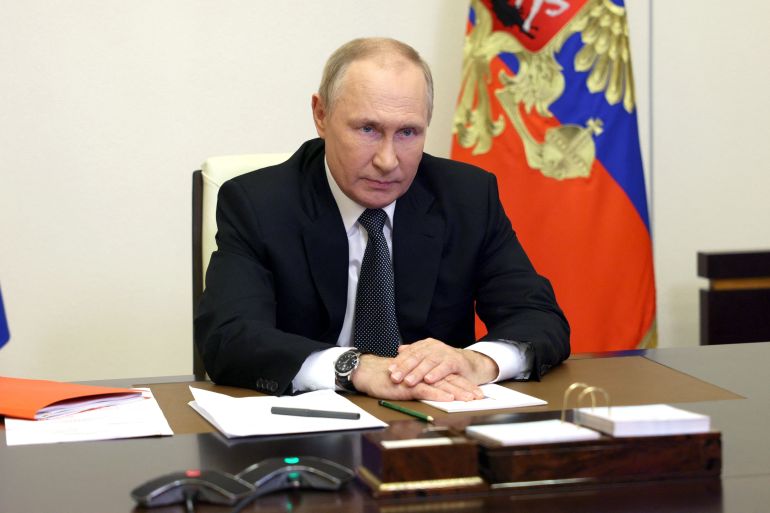Putin declares martial law in annexed regions of Ukraine
Russia’s president did not provide details of the extra powers the heads of annexed regions will have under his decree.

Russian President Vladimir Putin has declared martial law in Donetsk, Luhansk, Kherson and Zaporizhia, four regions of Ukraine that Russia proclaimed as annexed last month.
Putin did not immediately spell out the steps that would be taken under martial law, but said the measures were intended to increase the stability of the economy, industry and production in support of Russia’s special military operation in Ukraine.
Keep reading
list of 3 itemsRussia-Ukraine war: List of key events, day 237
Russia has destroyed 30 percent of Ukraine’s power stations: Kyiv
“We are working on solving very complex, large-scale tasks to ensure a reliable future for Russia, the future of our people,” he said in televised remarks to members of his Security Council on Wednesday.
Mykhailo Podolyak, a Ukrainian presidential adviser, rejected the move and said Kyiv would continue its counteroffensives against Russian forces in Ukraine.
“‘Martial law’ implementation on the occupied territories by Russia should be considered only as a pseudo-legalisation of (the) looting of Ukrainians’ property,” he wrote on Twitter.
“This does not change anything for Ukraine: we continue the liberation and deoccupation of our territories.”
Reporting from Moscow, Al Jazeera’s Mohammed Vall said that the declaration would have far-reaching consequences for those living in the Russian-occupied regions.
“It will mean more restrictions on the movement of people. It will mean the military and local administrations will have the right to do what they want in terms of how people move around, or restrict them from gathering,” he said.
“Political parties gathering and activities will be banned, and civilian or semi-civilian factories will be asked to reorient their production lines to help the military.
“The mobilisation in those regions will now be a total mobilisation instead of partial mobilisation, which has taken place in the Russian Federation,” he added.
Tighter security in Russian regions
Putin also gave additional emergency powers to the heads of all regions of Russia. The government was instructed to set up a special Coordination Committee under Prime Minister Mikhail Mishustin to work with Russia’s regions to boost Moscow’s war effort in Ukraine.
Russian state agency TASS reported that the decree would be sent for approval to the Federation Council – the upper house of Russia’s parliament – and that the lower house State Duma would be informed of the decision.
Putin did not provide details of the extra powers to be given to the heads of Russian regions under his decree, but said the order would be effective from Thursday.
Draft legislation indicates it may involve restrictions on travel and public gatherings, tighter censorship and broader authority for law enforcement agencies.
The annexation of the four partially occupied regions on September 30 came three days after the completion of Kremlin-orchestrated “referendums”, which are largely regarded as having no validity by the international community.
Despite the formal announcement, Russia is losing ground by the day to Kyiv’s counteroffensive. In Kherson, one of the four occupied regions, Moscow made plans this week to evacuate civilians.
Sergei Surovikin, a Russian air force general appointed on October 10 to lead the invasion, admitted that the situation was “very difficult“.
The “enemy is not abandoning its attempts to attack Russian troop positions,” he said on Wednesday.
Kherson is arguably the most strategically important of the four regions as it contains both the only land route to the occupied Crimean Peninsula, which Russia seized in 2014, and the mouth of the Dnieper River.
Surovikin has been nicknamed “General Armageddon” in Russian media after serving in Syria and Chechnya, where his forces pounded cities to rubble.
His appointment was followed by the biggest wave of missile attacks against Ukraine since the start of the war.